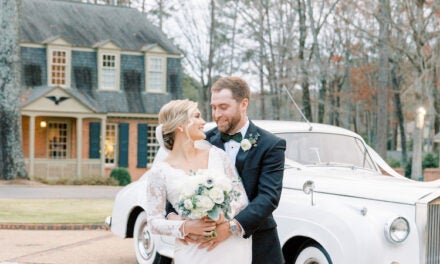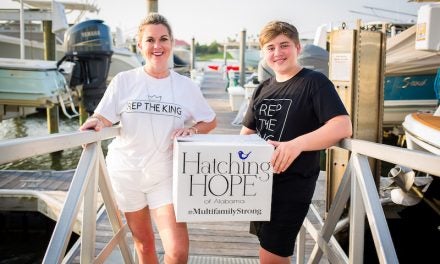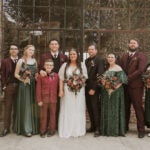Shelby County families open their homes to orphans, foster children
Story By Grace Thornton
Photos By Alabama Baptist Children’s Homes & Family Ministries
Amy Hacker’s home is full of pink these days.
Her bathroom is littered with bath toys and step stools, and her living room has playhouses and rocking chairs and puzzles.
And her guest room — which used to hold her bikes and a guest bed — now holds a 2-year-old little girl with a vivacious personality.
Hacker shakes her head about how she got to this point. It’s mysterious in the best kind of way.
And how long the little girl will be there — that’s mysterious too.
It’s a mystery Hacker signed up for when she said yes to being a single foster mom, something not all that uncommon at The Church at Brook Hills, where Hacker — a middle school teacher in her 30s — is a member.
In 2009, the church went through a sermon series on the biblical book of James, which contains a verse that says that to have “real religion” is to take care of orphans in their distress. The pastor at the time, David Platt, challenged the congregation to apply that to the place where they live and make sure no child in Shelby County went a night without a home.
“I took that to heart,” Hacker said.
And she wasn’t the only one.
Families across the congregation searched their hearts, prepared their homes and began to go through the training process to be foster parents. Others began to pursue adoption, both international and domestic.
And the result was a culture where kids were cared for.
“Because of those first families who came forward and took those classes in 2009 and 2010, it has just spread. As they’ve come in contact with others, others have felt drawn to be involved all across the metro area,” said Anita Bucher, who serves on staff at The Church at Brook Hills.

After hearing a sermon from the book of James, many members from The Church at Brook Hills opened their homes to orphans and foster children.
At Brook Hills alone, more than 30 families are serving as foster parents, and dozens more are serving as respite care providers or as “adoptive” families for foster parents, providing meals and babysitting and Christmas presents.
“It’s been really neat to see how the Lord has met all of our needs,” Hacker says of her and the little girl she’s been fostering since March.
A Brook Hills family has “adopted” Hacker, bringing meals and even trimming her tree to help support her as a foster parent.
The same sorts of things have happened for Layla and Andrew Varvoutis, who have served as foster parents for a total of four children now during the past four years, with placements ranging from a month to a year and a half.
“The support and the community has been so important,” Layla said.
Fostering isn’t without its challenges, and Brook Hills’ ministry to parents is designed to offset some of the pressure, Bucher said.
The church offers frequent moms’ days out, play dates in the park and other events, as well as a weekly support group that meets on Wednesday nights.
“We have lots of people who want a tangible way to be involved and offer them some relief, whether that’s running errands, fixing cars or helping throw birthday parties,” she said. “And as people have gotten involved in these ways, God has drawn some of them to be foster parents, too.”
 It’s not the result of a sermon, Bucher said — it’s the result of God’s work in the hearts of the congregation to want to love people who need to be loved. The James sermon just gave a handle for people to grab hold of to demonstrate that love tangibly.
It’s not the result of a sermon, Bucher said — it’s the result of God’s work in the hearts of the congregation to want to love people who need to be loved. The James sermon just gave a handle for people to grab hold of to demonstrate that love tangibly.
Andrew agreed.
“People can get overwhelmed at the size of problems and the systemic issues and the magnitude of poverty in the world and don’t know what to do,” he said. “Foster care is such a frontline way to get involved and make a change in one person’s life. It can make a dramatic impact on society and community.”
It’s a need that can be met, he said.
“There will always be people who don’t love children well, but if churches will stand in the gaps, we can do that well.”
Hacker agreed.
“The biggest joy of the past 10 months has been watching a child who’s been in distress and seeing how she was so sad and lonely and broken inside — you could just see her little spirit was broken when she came,” Hacker said. “Just to see that light change inside of her and her become a happy child, seeing that sadness turned into joy, seeing how God is faithful through the whole thing, it has been such a huge blessing.”
It’s hard sometimes to remember that she doesn’t know how much longer her foster daughter will be in her care, but Hacker said the whole thing is much bigger than her emotions.
“I love her and care about her, but I have to remember she’s God’s and not mine,” she said. “It’s not about what I want or about what I want to do — that’s not what God has called me to.”
Andrew said they faced the same realization when their first foster son left their care and went back to his home.
“I want to be a father to these kids while they are in my home, but more importantly, I want them to know their heavenly Father. That’s the most important thing for them to know and for me to remember,” he said. “These kids are ultimately His kids, not our kids. Ultimately He is their father, and that’s the most important lesson we can try to speak into their lives.”










